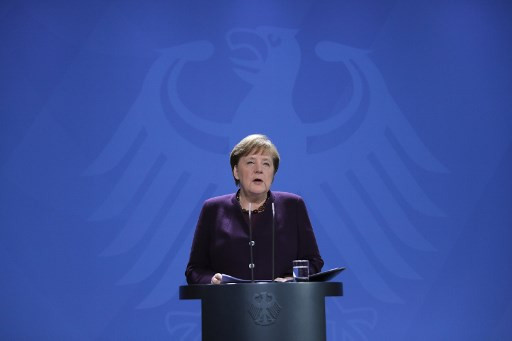Popular Reads
Top Results
Can't find what you're looking for?
View all search resultsPopular Reads
Top Results
Can't find what you're looking for?
View all search resultsCOVID-19: Key points of Germany's mega stimulus
Germany's biggest post-war package, worth around 130 billion euros (US$150 billion), includes cuts to the VAT, handouts to families, and subsidies for greener transport options.
Change text size
Gift Premium Articles
to Anyone
A
huge German stimulus package could help Europe's biggest economy recover swiftly from a deep slump triggered by the coronavirus pandemic, analysts said Thursday.
The country's biggest post-war package, worth around 130 billion euros (US$150 billion), includes cuts to the VAT, handouts to families, and subsidies for greener transport options.
Observers voiced surprise at its volume, particularly for a country that has been often criticized by neighbors and allies alike for its reticence to spend.
"It is not only the size of the packages which is remarkable but also the fact that the German government has made a complete U-turn in its approach to fiscal policy," said ING analyst Carsten Brzeski.
"This not only the case for Germany but also for Europe. From austerity champion to big spender - a few months ago... such a comment on German fiscal policy would have been almost unthinkable."
Spiegel Online noted that "Chancellor Angela Merkel had promised a 'courageous answer' to the crisis."
"The economic programme of the coalition is a surprise and ... not a negative one."
Economy Minister Peter Altmaier said Thursday that the government aimed to "return to the path of growth in the second half of the year."
Berenberg Bank analyst Holger Schmieding said the package backs the belief that "Germany will recover comparatively well from the Covid-19 recession with little lasting damage to its long-term supply potential."
Here are the main elements of the package:
Triggering consumer spending
The value-added tax (VAT) will be cut from 19 to 16 percent from July to December this year, a catch-all to boost spending.
Families will also get cash directly via a bonus of 300 euros per child, regardless of the parents' income level or whether they were directly hit economically by the crisis.
Help for companies
Sectors worst hit by the pandemic, including hospitality, tourism and sports, will get help to the tune of 25 billion euros.
Those that have seen their revenues shrink dramatically will have the bulk of their operating expenses picked up by the state.
Social security contributions will also be capped at 40 percent of wages – to help companies keep costs down.
Investments for future
Electric-car buyers will get a boost, with a state rebate doubling to 6,000 euros.
But crucially, the coalition refused to sign off on a bonus covering petrol and diesel vehicles after an energetic environmental protest.
To boost greener modes of transport, the state will plough five billion euros into rail giant Deutsche Bahn, whose traffic slowed to a crawl during Germany's lockdown.
Another seven billion euros are earmarked for a "hydrogen strategy" that includes how the technology could help wean the country off fossil fuels.










